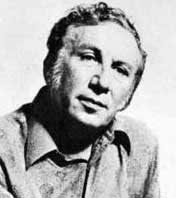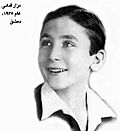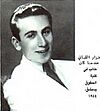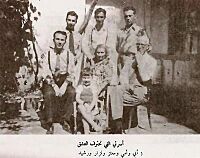Nizar Qabbani facts for kids
Quick facts for kids
Nizar Qabbani
|
|
|---|---|
 |
|
| Native name |
نزار توفيق قباني
|
| Born | 21 March 1923 Damascus, Syrian Federation |
| Died | 30 April 1998 (aged 75) London, England |
| Occupation | Diplomat, poet, writer, publisher، lawyer, intellectual |
| Nationality | Syrian |
Nizar Tawfiq Qabbani (Arabic: نزار توفيق قباني, ALA-LC: Nizār Tawfīq Qabbānī, French: Nizar Kabbani; 21 March 1923 – 30 April 1998) was a Syrian diplomat, poet, writer and publisher. He is considered to be Syria's National Poet. His poetic style combines simplicity and elegance in exploring themes of love, religion, and Arab empowerment against foreign imperialism and local dictators. Qabbani is one of the most revered contemporary poets in the Arab world. His famous relatives include Abu Khalil Qabbani, Sabah Qabbani, Rana Kabbani, Yasmine Seale.
Contents
Biography
Early life
Nizar Qabbani was born in the Syrian capital of Damascus to a middle class merchant family. Qabbani was raised in Mi'thnah Al-Shahm, one of the neighborhoods of Old Damascus and studied at the National Scientific College School in Damascus between 1930 and 1941. The school was owned and run by his father's friend, Ahmad Munif al-Aidi. He later studied law at Damascus University, which was called Syrian University until 1958. He graduated with a bachelor's degree in law in 1945.
While a student in college he wrote his first collection of poems entitled The Brunette Told Me, which he published in 1942. It was a collection of romantic verses that made several startling references to a woman's body, sending shock waves throughout the conservative society in Damascus. To make it more acceptable, Qabbani showed it to Munir al-Ajlani, the minister of education who was also a friend of his father and a leading nationalist leader in Syria. Ajlani liked the poems and endorsed them by writing the preface for Nizar's first book.
Diplomatic career
After graduating from law school, Qabbani worked for the Syrian Foreign Ministry, serving as Consul or cultural attaché in several capital cities, including Beirut, Cairo, Istanbul, Madrid, and London. In 1959, when the United Arab Republic was formed, Qabbani was appointed Vice-Secretary of the UAR for its embassies in China. He wrote extensively during these years and his poems from China were some of his finest. He continued to work in diplomacy until he tendered his resignation in 1966.
Poetic influences
At the age of fifteen, Nizar Qabbani’s sister died due to contested reasons. When asked whether he was a revolutionary, the poet answered: “Love in the Arab world is like a prisoner, and I want to set (it) free. I want to free the Arab soul, sense, and body with my poetry. The relationships between men and women in our society are not healthy.”
In 1981, Nizar Qabbani’s wife, Balqees, died in a bombing in Beirut, Lebanon, during the Lebanese civil war. The death of Balqees profoundly affected Qabbani’s psychology and poetry. He expressed his grief in an exceptionally moving poem titled Balqees. Qabbani blamed all Arab regimes for her death. Additionally, Qabbani used the death of his beloved Balqees to symbolize the death of Arab people in the Levant by their governments. "Balqees: I ask forgiveness. Maybe your life was for mine, a sacrifice. I know well that your killers’ aims were to kill my words. My beautiful, rest in peace. After you, poetry will cease and womanhood is out of place. Generations of children flocks Will keep asking about your long hair locks. Generations of lovers will read about you, the true instructor. One day the Arabs will get it that they killed the prophetess and the prophets."
The city of Damascus remained the most powerful muse in his poetry, most notably in the Jasmine Scent of Damascus. However, Qabbani expressed his love for all Arab citizens and cities from Mauritania extending to Iraq as one people connected by the same struggle and a rich past.
Qabbani was a vocal opponent of colonial and imperial western projects in the Middle East. Additionally, Qabbani frequently criticized Arab leaders for their corruption, oppression, and hypocrisy most notably in his poem Sultan: "O Sultan, my master, if my clothes are ripped and torn It is because your dogs with claws are allowed to tear me O Sultan! Because I dare to approach your deaf walls, because I tried to reveal my sadness and tribulation, I was beaten."
Personal life
Family
Qabbani had two sisters, Wisal and Haifa, and three brothers, Mu'taz, Rashid, and Sabah. The latter, Sabah Qabbani, became the director of Syrian radio and TV in 1960 and served as Syria's ambassador to the United States in the 1980s.
Nizar Qabbani's father, Tawfiq Qabbani, was Syrian, while his mother was of Turkish descent. His father had a chocolate factory; he also helped support fighters resisting the French Mandate for Syria and the Lebanon and was imprisoned many times for his views, greatly affecting the upbringing of Nizar into a revolutionary in his own right. Qabbani's grandfather, Abu Khalil Qabbani, was one of the leading innovators in Arab dramatic literature.
The Qabbanis were of Turkish origin and came from Konya. The family name, Qabbani, is derived from Qabban (Arabic: قبان) which means Steelyard balance.
Marriages
Nizar Qabbani married twice in his life. His first wife was his cousin Zahra Aqbiq; together they had a daughter, Hadba, and a son, Tawfiq. Tawfiq died due to a heart attack when he was 22 years old when he was in London. Qabbani eulogized his son in the famous poem "To the Legendary Damascene, Prince Tawfiq Qabbani". Zahra Aqbiq died in 2007. His daughter Hadba, born in 1947, was married twice, and lived in London until her death in April 2009.
His second marriage was to an Iraqi woman named Balqis al-Rawi, a schoolteacher he met at a poetry recital in Baghdad; she was killed in the 1981 Iraqi embassy bombing in Beirut during the Lebanese Civil War on 15 December 1981. Together they had a son, Omar, and a daughter, Zainab. After the death of Balqis, Qabbani did not marry again.
Late life and death
After the death of Balqis, Qabbani left Beirut. He was moving between Geneva and Paris, eventually settling in London, where he spent the last 15 years of his life. In exile, Qabbani continued to write poems.
At the age of 75, Nizar Qabbani died in London on 30 April 1998 of a heart attack.
In his will, which he wrote in his hospital bed in London, Nizar Qabbani wrote that he wished to be buried in Damascusю The great Arab poet was mourned by Arabs all over the world, with international news broadcasts highlighting his illustrious literary career.
Awards and tributes
- 1992–1993 Al Owais Award for Cultural & Scientific Achievements.
- On 21 March 2016, Google celebrated his 93rd birthday with a Google Doodle.
See also
 In Spanish: Nizar Qabbani para niños
In Spanish: Nizar Qabbani para niños
- List of Arabic-language poets




